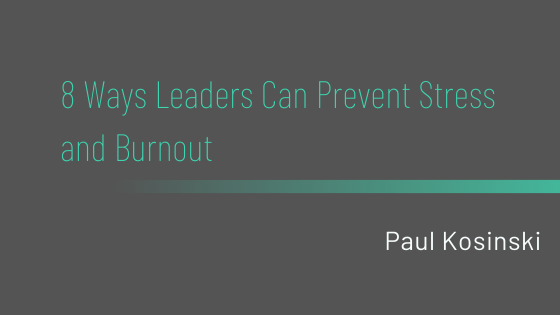In recent years, we’ve heard a lot about the negative consequences of too much stress and burnout. Stress is related to many health problems and depression. Burnout is when you feel overworked, overwhelmed, or exhausted by your job. There are ways that leaders can prevent these two things from happening at work. Here are some ideas for ways to prevent stress and burnout:
1) Spending time away from work:
To stay fresh and healthy, leaders should set aside some time each day for non-work activities. When you spend time away from your job, you can recharge and get a different perspective. It’s also important to avoid working all the time by setting up boundaries around when you do work and when you don’t.
2) Having a work-life balance:
The main component in having a healthy home life is to be committed to it. Finding time for your kids, spouse or friends can relieve stress because these people are important to you. If you want extra help creating a schedule that works for your family, there are many tools online to help you.
3) Analyzing your stressors:
Identify the components of your job that cause you the most stress. When you know what causes the most tension, it’s easier to develop solutions to reduce or eliminate them. For example, if meetings are a big source of trouble, schedule a personal time during your workday.
4) Making time for exercise:
Use any time you have leftovers to be physically active in some way. Exercise reduces stress and mental fatigue. Set aside thirty minutes a day at least three times a week, so you can go for a walk or run, lift weights or do yoga.
5) Taking a vacation:
Even a few days of vacation can help you feel refreshed, but many people don’t take enough time off from work. In fact, according to one survey, the average American only takes half of their allotted vacation days each year. Many workers stay in touch with their office via email while on vacation and they answer questions that could have waited until their return.
6) Having a strong support network:
The more people you know who support your goals, the easier it will be to push through difficult times at work. A mentor, colleague, or friend can help you brainstorm solutions when you’re stuck or simply listen if you share a frustrating experience.
7) Working on self-awareness:
When you’re aware of how your emotions affect your performance, it becomes easier to manage what’s inside. Anger is one example of an emotion that can lead you to take actions you later regret. Use techniques like mindfulness or meditation to help keep yourself in check.
8) Having a good attitude:
Your attitude can affect your experience at work and in life. If you keep a positive mindset, even when challenges arise, it becomes easier to remain calm instead of becoming overwhelmed by frustration or anger. Stay positive by making sure your expectations are realistic and that you’re taking the right actions.


